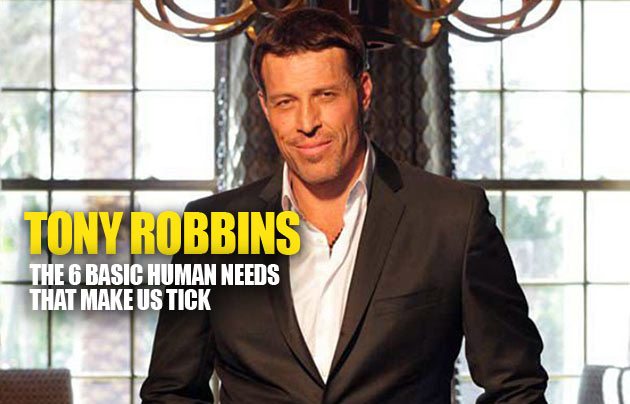Success Advice
The 6 Basic Human Needs That Make Us Tick

I’ve seen it a million times–people equate their net worth with their self worth. Their identity is married so deeply to their bank statements and quarterly portfolio reports that they’ve forgotten that money is simply a vehicle for trying to meet our needs, almost all of which are not financial.
We’re all familiar with the cliche that money cannot buy happiness, but I’m convinced that almost everybody has to learn that lesson the hard way because let’s face it; the idea of having enough money to throw at your problems until they’re solved is a seductive impulse.
It certainly was something I constantly thought about as a kid. Growing up, money was always out of reach. It was always a source of stress because there was never enough of it. I remember knocking on the neighbor’s door to ask for food for my brother and sister and me.
Then, on a Thanksgiving Day when I was 11 years old, something happened that changed my life forever. As usual, there was no food in the house, and my parents were fighting. I heard someone knocking at the front door. I opened it a crack and saw a man standing on the steps with grocery bags filled with enough food for a big Thanksgiving dinner. I could hardly believe it.
Fast forward several years to when I was 17. I saved my money from working nights as a janitor and went out on Thanksgiving and fed two families. It was one of the most moving experiences of my life. I’d learned the joy of giving and to this day I consider contribution to be one of the six most important things every person needs.
Whatever emotion you’re after, whatever vehicle you pursue—building a business, getting married, raising a family, traveling the world—whatever you think your nirvana is, there are six basic, universal needs that make us tick and drive all human behavior. Combined, they are the force behind the crazy things (other) people do and the great things we do. We all have the same six needs, but how we value those needs and in what order, determines the direction of our life.
Need 1: Certainty/Comfort
The first human need is the need for Certainty. It’s our need to feel in control and to know what’s coming next so we can feel secure. It’s the need for basic comfort, the need to avoid pain and stress, and also to create pleasure. Our need for certainty is a survival mechanism. It affects how much risk we’re willing to take in life—in our jobs, in our investments, and in our relationships.
The higher the need for certainty, the less risk you’ll be willing to take or emotionally bear. By the way, this is where your real “risk tolerance” comes from.
Need 2: Uncertainty/Variety
Let me ask you a question: Do you like surprises?
If you answered “yes,” you’re kidding yourself! You like the surprises you want. The ones you don’t want, you call problems! But you still need them to put some muscle in your life. You can’t grow muscle—or character—unless you have something to push back against.
Need 3: Significance
We all need to feel important, special, unique, or needed. So how do some of us get significance? You can get it by earning billions of dollars, or collecting academic degrees—distinguishing yourself with a master’s or a PhD. You can build a giant Twitter following. Or you can go on The Bachelor or become the next Real Housewife of Orange County. Some do it by putting tattoos and piercings all over themselves and in places we don’t want to know about.
You can get significance by having more or bigger problems than anybody else. “You think your husband’s a dirt bag, take mine for a day!” Of course, you can also get it by being more spiritual (or pretending to be).
Spending a lot of money can make you feel significant, and so can spending very little. We all know people who constantly brag about their bargains, or who feel special because they heat their homes with cow manure and sunlight. Some very wealthy people gain significance by hiding their wealth. Like the late Sam Walton, the founder of Wal-Mart and for a time the richest man in America, who drove around Bentonville, Arkansas, in his old pickup, demonstrating he didn’t need a Bentley—but of course, he did have his own private fleet of jets standing by.
Significance is also a money maker—that’s where my dear friend Steve Wynn has made his fortune. The man who made Las Vegas what it is today knows people will pay for anything they believe is “the best,” anything that makes them feel special, unique or important, anything that makes them stand out from the crowd. He provides the most exclusive, luxurious experiences imaginable in his casinos and hotels—they are truly magnificent and unmatched in the world.
Need 4: Love & Connection
The fourth basic need is Love and Connection. Love is the oxygen of life; it’s what we all want and need most. When we love completely we feel alive, but when we lose love, the pain is so great that most people settle on connection, the crumbs of love. You can get that sense of connection or love through intimacy, or friendship, or prayer, or walking in nature. If nothing else works, you can get a dog.
These first four needs are what I call the needs of the personality. We all find ways to meet these—whether by working harder, coming up with a big problem, or creating stories to rationalize them. The last two are the needs of the spirit. These are more rare—not everyone meets these. When these needs are met, we truly feel fulfilled.
Need 5: Growth
If you’re not growing, you’re dying. If a relationship is not growing, if a business is not growing, if you’re not growing, it doesn’t matter how much money you have in the bank, how many friends you have, how many people love you—you’re not going to experience real fulfillment. And the reason we grow, I believe, is so we have something of value to give.
Need 6: Contribution
Corny as it may sound, the secret to living is giving. Life’s not about me; it’s about we. Think about it, what’s the first thing you do when you get good or exciting news? You call somebody you love and share it. Sharing enhances everything you experience.
Life is really about creating meaning. And meaning does not come from what you get, it comes from what you give. Ultimately it’s not what you get that will make you happy long term, but rather who you become and what you contribute will.
Now think about how money can fulfill the six human needs. Can money give us certainty? You bet. Variety? Check. Obviously it can make us feel important or significant. But what about connection and love? In the immortal words of the Beatles, money can’t buy you love. But it can buy you that dog! And it can, unfortunately, give you a false sense of connection because it attracts relationships, although not always the most fulfilling kind. How about growth? Money can fuel growth in business and in learning. And the more money you have, the more you can contribute financially.
But here’s what I truly believe: if you value Significance above all else, money will always leave you empty unless it comes from a contribution you’ve made. And if you’re looking for significance from money, it’s a high price to pay. You’re looking for big numbers but it’s unlikely you’ll find big fulfillment.
The ultimate significance in life comes not from something external, but from something internal. It comes from a sense of esteem for ourselves, which is not something we can ever get from someone else. People can tell you you’re beautiful, smart, intelligent, the best, or they can tell you that you are the most horrible human being on earth—but what matters is what you think about yourself. Whether or not you believe that deep inside you are continuing to grow and push yourself, to do and give more than was comfortable or you even thought possible. The wealthiest person on earth is one who appreciates.

Feature Image Originally Appeared on HauteTime.com
Business
The Simple Security Stack Every Online Business Needs
Most small businesses are exposed online without realising it. This simple protection stack keeps costs low and risks lower.

Running a business online brings speed and reach, but it also brings risk. Data moves fast. Payments travel across borders. Teams log in from homes, cafés, and airports. (more…)
Business
If Your Business Internet Keeps Letting You Down, Read This
From smoother operations to better security, dedicated internet access is quietly powering today’s high-performing businesses.

Today, a dependable internet service is the bedrock for uninterrupted business operations. Many organizations rely on stable online connections for communication, data transfer, and customer interaction. (more…)
Did You Know
How Skilled Migrants Are Building Successful Careers After Moving Countries
Behind every successful skilled migrant career is a mix of resilience, strategy, and navigating systems built for locals.

Moving to a new country for work is exciting, but it can also be unnerving. Skilled migrants leave behind familiar systems, networks, and support to pursue better job opportunities and a better future for their families. (more…)
-

 News2 weeks ago
News2 weeks agoBrandon Willington Builds 7-Figure Business by Ignoring Almost Everything
-

 Health & Fitness3 weeks ago
Health & Fitness3 weeks agoWhat Minimalism Actually Means for Your Wellness Choices
-

 Did You Know2 weeks ago
Did You Know2 weeks agoWhy Most Online Courses Fail and How to Fix Them
-

 Business2 weeks ago
Business2 weeks agoIf Your Business Internet Keeps Letting You Down, Read This
-

 Business6 days ago
Business6 days agoEntrepreneur’s Guide to Pay Stubs: Why Freelancers and Small Business Owners Need a Smart Generator
-

 Business5 days ago
Business5 days agoThe Simple Security Stack Every Online Business Needs
-

 Scale Your Business4 days ago
Scale Your Business4 days ago5 Real Ways to Grow Your User Base Fast
-

 Business3 days ago
Business3 days agoThe Salary Shift Giving UK Employers An Unexpected Edge




























8 Comments